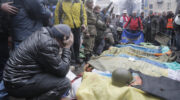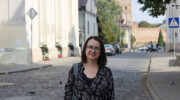Generosity Europe
The Ukrainian cafe serving soldiers free food and motherly love
| View caption Hide caption
When is a roadside cafe more than a roadside cafe? When it’s in Ukraine, and the service runs from free borscht to restoring wounded soldiers’ will to live.
On this road to war, the cafe has become a sanctuary, renowned not only for the sustenance of its home-cooked food and as a place to rest, but also for the loving motherly care offered by Nataliia Bilovol, the cafe owner, and her team of volunteers.
“Every time we see a person come back again, we are so happy to see them alive,” says Ms. Bilovol, who wears an olive drab polo shirt emblazoned with patch strips that read “volunteer” and “combat.”
“Every time we see them again and again, their hugs get stronger and stronger,” says Ms. Bilovol of the soldiers’ reaction. “They tell us, ‘With backing like this, we are able to fight properly. Ladies, please have our backs, and we will hold the defense.’”
View caption Hide caption
Memories, sweet and sour
When Russia invaded Ukraine on Feb. 24, 2022, Ms. Bilovol closed her cafe. But as soldiers deployed to the eastern front lines to block the Russian advance, they stopped off for supplies at her shop next door.
She and other volunteers began to give the troops coffee on their buses. Then a table was brought outside to serve borscht, the savory Ukrainian beet soup with dill and sour cream.
View caption Hide caption
Today the cooking area has cabin-style log walls, where volunteers peel endless supplies of potatoes and onions, and vats of mouth-watering soup and stew simmer on gas and log-burning stoves.
In the dimly lit cafeteria itself, where the scent of dill and pickled vegetables is a strong reminder of a typical Ukrainian kitchen, the one long table is constantly laden with food. The cafe serves some 2,500 free meals a day, surviving with the help, in cash and kind, of donors near and far – from local villagers who bring food to distant supporters in Europe and the United States.
The respect and gratitude of those who pass through are clear from the walls, which are draped with yellow and blue Ukrainian flags signed by soldiers and pinned with a multitude of military unit patches.
At one end of the canteen, Orthodox religious icons share space with battlefield artifacts, including the rear plate of a U.S.-supplied HIMARS rocket, expended tank shells, and the skeletal frames of Russian cluster munition canisters.
It is as if the whole war has funneled its way through here. And that means that Ms. Bilovol and her 70 or so volunteers share all the emotions of the men they sustain.
“It’s always hard to remember all the wounded soldiers” who do not return, says Ms. Bilovol. But some memories bring a smile, such as the soldier she fed in his ambulance parked outside because his leg wounds prevented him from walking.
“He kept asking what the place looked like, and I showed him pictures of it on my mobile phone. He ate and promised that he would definitely come back,” recalls Ms. Bilovol.
View caption Hide caption
When he did, he was returning to fight on the eastern front. “He stood up on his legs and hugged us and thanked all of us for the help and the warmth we gave him,” she says, her eyes welling up. “That was such a powerful emotional moment for all of us.”
Restoring the will to live
Among the volunteers is a retired school secretary, Valentyna Lushchynska, who wears a bright green shirt and head wrap, an embroidered black apron, and a mischievous smile. She started working here the very first day the canteen opened.
“I took everything from my cellar,” says Ms. Lushchynska of her first donations. “And all the neighbors said, ‘We’ll be killed anyway, so take our chickens and supplies too.’
“It’s very hard work, so a lot of people have left this job already. But I am an old one; I am tough,” says the pensioner.
“People ask, ‘Why do you keep coming here?’ I tell them, ‘It’s like the call of my soul.’ The gratitude of the soldiers is like a gold medal on this side and a gold medal on that side,” she says proudly, pointing to each side of her chest.
She recalls feeding one soldier who had lost one arm and one leg, and had not eaten for four days.
View caption Hide caption
In his ambulance, he pulled her close to express his thanks, she remembers, and said, “I want to kiss your hands because I had a black curtain blocking my life. When I saw you, with your warmth, from that moment I wanted to live again.”
Life is not always that intense at the cafe. More lighthearted moments enliven the place.
On one recent day, the soldiers in charge of the recovery vehicle that had pulled over, pistols on their hips, were enjoying a hot lunch and explaining why they come regularly. “The food is delicious,” said one man who gave the name Zhenia. “The food is like home.”
Volunteer server Nelya Shaykhutdynova stopped making coffee for a moment as the last soldier left. “At least take some pie in your pocket,” she implored him.
He didn’t need any persuading.
Oleksandr Naselenko supported reporting for this story.




